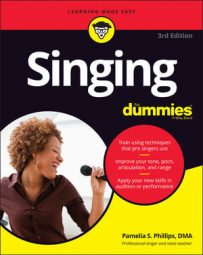Music preference may be the most obvious difference you encounter between a young singer and a teenager, but other differences exist. Young singers and teenagers are different in the following ways:
Range: Young singers have a limited range; they need songs with a narrow range that focus on subjects they enjoy. Teenagers need music that’s a little more hip and cool, yet still not incredibly taxing vocally, because their voices are still developing.
For teenage males who’ve recently experienced some voice changes, lower sounds may be new and temporarily unreliable. A young singer probably has a range of fewer than 8 notes, and a teenager likely has a range of between 8 and 16 notes.
Training: Most young singers can benefit from singing in a choir or joining a group singing class just to explore music. If your youngster joins a choir or group singing class, make sure that the class focuses on sounds appropriate for his or her age.
Really young singers often can’t make much sound when they sing because their larynx is still growing and developing. However, plenty of sound is usually the first thing a novice director asks for. If your child ends up pushing or is really tired after rehearsals, explore other choirs or classes that work at a more appropriate level.
Many young singers want to sound just like the latest pop star. They don’t really realize that the pop star has all kinds of equipment and sound engineers helping make the sounds. The more you can expose your young singer to singers of the same age, the better.
Take young singers to elementary-school music concerts or junior-high concerts so that they can hear their peers sing live and know what voices their age sound like.
Some teenagers with mature voices are ready for lessons and training. As long as the teacher is quite good with adolescents, lessons can be beneficial. If the teacher doesn’t allow the students to choose any songs, or if the students aren’t allowed to pick anything fun to sing, they may lose interest.
Watch for consistent progress. You don’t have to know a lot about singing to help your child. Keep asking questions, as you probably do about any other subject you aren’t familiar with, and listen to your child talk about the songs (not wanting to practice is a good sign the teenager doesn’t like the music) and enthusiasm for the next lesson.
Some teenagers are more ready to take direction and constructive criticism than other teenagers are. If your child’s ego is still a bit delicate, you want to hire a teacher who can make positive changes in the teen’s voice with humor and enthusiasm.

